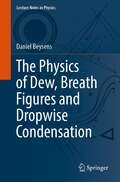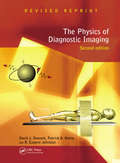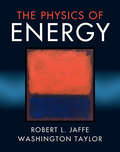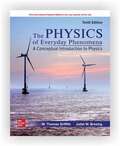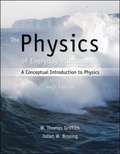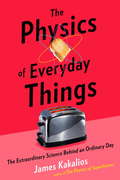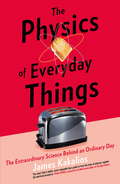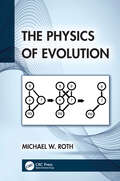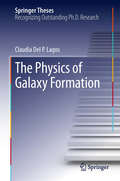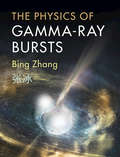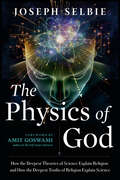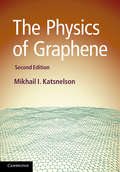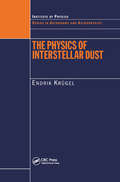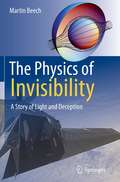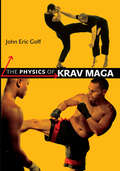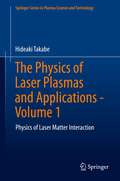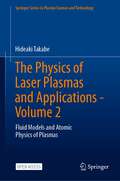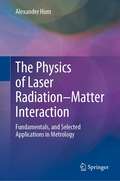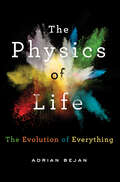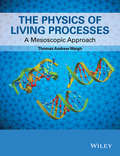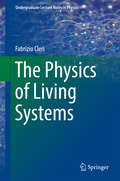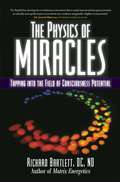- Table View
- List View
The Physics of Dark Shadows: Time Travel, ESP, and the Laboratory
by Frank BorzellieriIn "The Physics of Dark Shadows," Frank Borzellieri reveals for the first time that so many of the bizarre, supposedly supernatural occurrences on Dark Shadows actually have their bases in scientific reality. He points out in fascinating detail how time travel in no way defies the laws of physics and is irrefutably proven through Einstein's theories. In fact, not only can time travel actually happen, it already has happened! These concepts, including traveling to the past and future, as well as parallel time, have a scientific foundation and are studied vigorously in the world's leading institutions and scientific journals. While the time traveling methods of Professor Stokes. Barnabas Collins, and Julia Hoffman may differ from Einstein's wormholes and light speed, the basic notions are very real. Moreover, the extrasensory perception utilized by Angelique and other Dark Shadows characters also has a long and distinguished history of respectable scientific study. Mixing the theories of Einstein, Stephen Hawking, and the world's leading physicists with countless examples from the storylines of Dark Shadows, Frank Borzellieri writes in a manner both scholarly yet enjoyable for the average Dark Shadows fan.
The Physics of Deformation and Fracture of Polymers
by A. S. ArgonDemonstrating through examples, this book presents a mechanism-based perspective on the broad range of deformation and fracture response of solid polymers. It draws on the results of probing experiments and considers the similar mechanical responses of amorphous metals and inorganic compounds to develop advanced methodology for generating more precise forms of modelling. This, in turn, provides a better fundamental understanding of deformation and fracture phenomena in solid polymers. Such mechanism-based constitutive response forms have far-reaching application potential in the prediction of structural responses and in tailoring special microstructures for tough behaviour. Moreover, they can guide the development of computational codes for deformation processing of polymers at any level. Applications are wide-ranging, from large strain industrial deformation texturing to production of precision micro-fluidic devices, making this book of interest to both advanced graduate students and to practising professionals.
The Physics of Dew, Breath Figures and Dropwise Condensation (Lecture Notes in Physics #994)
by Daniel BeysensIn this book, the author focuses on the physics behind dew, breaths figures, and dropwise condensation phenomena to introduce scientists, engineers and students to the many original processes involved in condensation. Consisting of 15 Chapters, 18 Appendices and over 500 references, the reader learns the needed theoretical backgrounds and formulae to understand the complexity of dropwise condensation. Heat and mass transfer, nucleation and growth on various substrates are considered (solid, liquid, plastic, undergoing phase change or micro-patterned substrates). The particular role of thermal or geometrical discontinuities where growth can be enhanced or reduced, dynamical aspects of self-diffusion, problems related to drop collection by gravity and the optics of dropwise condensation are all discussed. Although the content mainly deals with condensation from humid air, it can readily be generalized to condensation of any substance. The specificities of pure vapor condensation (e.g. steam) are also examined. Numerous images are provided within the text to illustrate the physics. This book is meant for those studying or researching dew and dropwise condensation, but also for individuals wishing to develop their knowledge on the subject.
The Physics of Diagnostic Imaging
by David Dowsett Patrick A Kenny R Eugene JohnstonOver recent years there has been a vast expansion in the variety of imaging techniques available, and developments in machine specifications continue apace.
The Physics of Energy
by Robert L. Jaffe Washington TaylorThe Physics of Energy provides a comprehensive and systematic introduction to the scientific principles governing energy sources, uses, and systems. This definitive textbook traces the flow of energy from sources such as solar power, nuclear power, wind power, water power, and fossil fuels through its transformation in devices such as heat engines and electrical generators, to its uses including transportation, heating, cooling, and other applications. The flow of energy through the Earth's atmosphere and oceans, and systems issues including storage, electric grids, and efficiency and conservation are presented in a scientific context along with topics such as radiation from nuclear power and climate change from the use of fossil fuels. Students, scientists, engineers, energy industry professionals, and concerned citizens with some mathematical and scientific background who wish to understand energy systems and issues quantitatively will find this textbook of great interest.
The Physics of Ettore Majorana
by Salvatore EspositoThrough just a handful of papers, Ettore Majorana left an indelible mark in the fields of physics, mathematics, computer science and even economics before his mysterious disappearance in 1938. It is only now that the importance of Majorana's work is being realised: Majorana fermions are intensely studied today, and his work on neutrino physics has provided possible explanations for the existence of dark matter. In this unique volume, Salvatore Esposito explores not only Majorana's known papers but, even more interestingly, unveils his unpublished works as well. These include powerful methods and results, ranging from the atomic two-centre problem, the Thomas-Fermi model and ferromagnetism to quasi-stationary states, n-component relativistic wave equations and quantum scalar electrodynamics. Featuring biographical notes and contributions from leading experts Evgeny Akhmedov and Frank Wilczek, this fascinating book will captivate graduate students and researchers interested in frontier science as well as in the history of science.
The Physics of Everyday Phenomena: A Conceptual Introduction to Physics
by W. Thomas Griffith Juliet Wain BrosingThe Physics of Everyday Phenomena introduces students to the basic concepts of physics, using examples of common occurrences in everyday life. Intended for use in a one-semester or two-semester course in conceptual physics, this book is written in a narrative style, frequently using questions designed to draw the reader into a dialogue about the ideas of physics. This inclusive style allows the book to be used by anyone interested in exploring the nature of physics and explanations of everyday physical phenomena.
The Physics of Everyday Phenomena: A Conceptual Introduction to Physics, Sixth Edition
by W. Thomas Griffith Juliet W. BrosingThe Physics of Everyday Phenomena, Sixth Edition, introduces students to the basic concepts of physics using examples of common occurrences. Intended for use in a one-semester or two-semester course in conceptual physics, this book is written in a narrative style, frequently using questions designed to draw the reader into a dialogue about the ideas of physics.
The Physics of Everyday Things: The Extraordinary Science Behind an Ordinary Day
by James KakaliosPhysics professor, bestselling author, and dynamic storyteller James Kakalios reveals the mind-bending science behind the seemingly basic things that keep our daily lives running, from our smart phones and digital “clouds” to x-ray machines and hybrid vehicles. Most of us are clueless when it comes to the physics that makes our modern world so convenient. What’s the simple science behind motion sensors, touch screens, and toasters? How do we glide through tolls using an E-Z Pass, or find our way to new places using GPS? In The Physics of Everyday Things, James Kakalios takes us on an amazing journey into the subatomic marvels that underlie so much of what we use and take for granted. Breaking down the world of things into a single day, Kakalios engages our curiosity about how our refrigerators keep food cool, how a plane manages to remain airborne, and how our wrist fitness monitors keep track of our steps. Each explanation is coupled with a story revealing the interplay of the astonishing invisible forces that surround us. Through this “narrative physics,” The Physics of Everyday Things demonstrates that—far from the abstractions conjured by terms like the Higgs Boson, black holes, and gravity waves—sophisticated science is also quite practical. With his signature clarity and inventiveness, Kakalios ignites our imaginations and enthralls us with the principles that make up our lives.
The Physics of Everyday Things: The Extraordinary Science Behind an Ordinary Day
by James KakaliosMost of us are clueless when it comes to the physics that makes our modern world so convenient. What's the simple science behind motion sensors, touch screens and toasters? How do we enter our offices using touch-on passes or find our way to new places using GPS? In The Physics of Everyday Things, James Kakalios takes us on an amazing journey into the subatomic marvels that underlie so much of what we use and take for granted.Breaking down the world of things into a single day, Kakalios engages our curiosity about how our refrigerators keep food cool, how a plane manages to remain airborne, and how our wrist fitness monitors keep track of our steps. Each explanation is coupled with a story revealing the interplay of the astonishing invisible forces that surround us. Through this 'narrative physics' The Physics of Everyday Things demonstrates that - far from the abstractions conjured by terms like the Higgs boson, black holes and gravity waves - sophisticated science is also quite practical. With his signature clarity and inventiveness, Kakalios ignites our imaginations and enthralls us with the principles that make up our lives.
The Physics of Evolution
by Michael W. RothThis book provides an introduction to the significant role of physics in evolution, based on the ideas of matter and energy resource flow, organism self-copying, and ecological change. The text employs these ideas to create quantitative models for important evolutionary processes.Many fields of science and engineering have come up against the problem of complex design—when details become so numerous that computer power alone cannot make progress. Nature solved the complex-design problem using evolution, yet how it did so has been a mystery. Both laboratory experiments and computer-simulation attempts eventually stopped evolving. Something more than Darwin’s ideas of heredity, variation, and selection was needed. The solution is that there is a fourth element to evolution: ecological change. When a new variation is selected, this can change the ecology, and the new ecology can create new opportunities for even more new variations to be selected. Through this endless cycle, complexity can grow automatically. This book uses the physics of resource flow to describe this process in detail, developing quantitative models for many evolutionary processes, including selection, multicellularity, coevolution, sexual reproduction, and the Serengeti Rules. The text demonstrates that these models are in conceptual agreement with numerous examples of biological phenomena, and reveals, through physics, how complex design can arise naturally. This will serve as a key text on the part physics plays in evolution, and will be of great interest to students at the university level and above studying biophysics, physics, systems biology, and related fields.
The Physics of Galaxy Formation
by Claudia Del P. LagosThis thesis addresses two of the central processes which underpin the formation of galaxies: the formation of stars and the injection of energy into the interstellar medium from supernovae, called feedback. In her work Claudia Lagos has completely overhauled the treatment of these processes in simulations of galaxy formation. Her thesis makes two major breakthroughs, and represents the first major steps forward in these areas in more than a decade. Her work has enabled, for the first time, predictions to be made which can be compared against new observations which probe the neutral gas content of galaxies, opening up a completely novel way to constrain the models. The treatment of feedback from supernovae, and how this removes material from the interstellar medium, is also likely to have a lasting impact on the field. Claudia Lagos Ph. D. thesis was nominated by the Institute for Computational Cosmology at Durham University as an outstanding Ph. D. thesis 2012.
The Physics of Gamma-Ray Bursts
by Professor Bing ZhangGamma-ray bursts (GRBs) are the most luminous explosions in the universe, which within seconds release energy comparable to what the Sun releases in its entire lifetime. The field of GRBs has developed rapidly and matured over the past decades. Written by a leading researcher, this text presents a thorough treatment of every aspect of the physics of GRBs. It starts with an overview of the field and an introduction to GRB phenomenology. After laying out the basics of relativity, relativistic shocks, and leptonic and hadronic radiation processes, the volume covers all topics related to GRBs, including a general theoretical framework, afterglow and prompt emission models, progenitor, central engine, multi-messenger aspects (cosmic rays, neutrinos, and gravitational waves), cosmological connections, and broader impacts on fundamental physics and astrobiology. It is suitable for advanced undergraduates, graduate students, and experienced researchers in the field of GRBs and high-energy astrophysics in general.
The Physics of God: How the Deepest Theories of Science Explain Religion and How the Deepest Truths of Religion Explain Science
by Joseph Selbie“An impressive and thought-provoking work . . . regarding the metaphysical mysteries of life, physical reality, and human consciousness. Highly recommended!” —Spirituality TodayScience and religion are often thought to be in conflict. But the contemporary fields of relativity, quantum physics, neuroscience, and more are in agreement with the transcendent phenomena described by saints, sages, and near-death experiencers. Today’s science actually provides profound insight into miracles, immortality, heaven, God, and transcendent awareness.The Physics of God describes the intersections of science and religion with colorful, easy-to-understand metaphors, making abstruse subjects within both science and religion easily accessible to the layman. This intriguing book:Pulls back the curtain on the light-show illusion we call matter.Connects string theory to religion’s transcendent heavens.Reveals the scientific secret of life and immortality.Demonstrates the miracle-making power of our minds to effect instantaneous physiological changes.Included in this revised edition is a new chapter on the physics of meditation and other updates.
The Physics of Graphene
by Mikhail I. KatsnelsonLeading graphene research theorist Mikhail I. Katsnelson systematically presents the basic concepts of graphene physics in this fully revised second edition. The author illustrates and explains basic concepts such as Berry phase, scaling, Zitterbewegung, Kubo, Landauer and Mori formalisms in quantum kinetics, chirality, plasmons, commensurate-incommensurate transitions and many others. Open issues and unsolved problems introduce the reader to the latest developments in the field. New achievements and topics presented include the basic concepts of Van der Waals heterostructures, many-body physics of graphene, electronic optics of Dirac electrons, hydrodynamics of electron liquid and the mechanical properties of one atom-thick membranes. Building on an undergraduate-level knowledge of quantum and statistical physics and solid-state theory, this is an important graduate textbook for students in nanoscience, nanotechnology and condensed matter. For physicists and material scientists working in related areas, this is an excellent introduction to the fast-growing field of graphene science.
The Physics of Interstellar Dust
by Endrik KrugelInterstellar dust grains catalyse chemical reactions, absorb, scatter, polarise and re-radiate starlight and constitute the building blocks for the formation of planets. Understanding this interstellar component is therefore of primary importance in many areas of astronomy & astrophysics. For example, observers need to understand how dust effects l
The Physics of Invisibility
by Martin BeechThe ability is see is fundamental to our very existence. How true our perceptions really are depends upon many factors, and not least is our understanding of what light is and how it interacts with matter. It was said that the camera, the icon of light recording instruments, never lies, and in the day of the glass plate and celluloid roll-film this might well have been true. But in this modern era, with electronic cameras and computer software, it is often safe to assume that the camera always lies. The advertising images that bombard our every waking moment are manipulated in shape, profile, color, and form. In this new era, light can be manipulated with metamaterials to make one object look like another or even cause that objects to vanish, literally before our eyes; not only can the image we see be manipulated, but so can the light itself.
The Physics of Krav Maga
by John Eric GoffThe art and science of real-world fighting. Explore the physics behind the physical!Krav Maga ("contact combat" in Hebrew) is a hard-hitting and efficient form of self-defense that was popularized by Israeli soldiers. Stressing practical, real-world fighting and a philosophy of self-defense, its popularity has grown worldwide over the past few decades. In The Physics of Krav Maga, John Eric Goff, a physicist, best-selling author, and martial arts practitioner, explains the science behind dozens of Krav Maga moves, from headlocks to hammer fists. Focusing on Warrior Krav Maga, a fighting style that combines the key elements of Krav Maga with kickboxing, wrestling, karate, and other fighting specialties, this equation-free, conceptual introduction is aimed at martial arts practitioners interested in refining their fighting technique and all fans of the fascinating moment when sports meet science.With step-by-step descriptions and detailed photos of each critical motion, Goff takes a scientific look at everything from punch speed to power output and reaction time. Armed with this book, readers will understand the physics behind each move. They will also learn how to• enhance their level of physical fitness• disrupt an opponent's balance—while keeping theirs• make use of leverage to defeat a larger, stronger attacker• become faster and more powerful• inflict pain up close• use weapons—and "weapons of opportunity"• and much more!Anyone interested in martial arts, in how physics applies to sports and combat, and in how a physicist wins a fight will love The Physics of Krav Maga.
The Physics of Laser Plasmas and Applications - Volume 1: Physics of Laser Matter Interaction (Springer Series in Plasma Science and Technology)
by Hideaki TakabeThe series of books discusses the physics of laser and matter interaction, fluid dynamics of high-temperature and high-density compressible plasma, and kinetic phenomena and particle dynamics in laser-produced plasma. The book (Vol.1) gives the physics of intense-laser absorption in matter and/or plasma in non-relativistic and relativistic laser-intensity regime. In many cases, it is explained with clear images of physics so that an intuitive understanding of individual physics is possible for non-specialists. For intense-laser of 1013-16 W/cm2, the laser energy is mainly absorbed via collisional process, where the oscillation energy is converted to thermal energy by non-adiabatic Coulomb collision with the ions. Collisionless interactions with the collective modes in plasma are also described. The main topics are the interaction of ultra-intense laser and plasma for the intensity near and over 1018W/cm2. In such regime, relativistic dynamics become essential. A new physics appears due to the relativistic effects, such as mass correction, relativistic nonlinear force, chaos physics of particle motions, and so on. The book provides clearly the theoretical base for challenging the laser-plasma interaction physics in the wide range of power lasers. It is suitable as a textbook for upper-undergraduate and graduate students as well as for readers who want to understand the whole physics structure about what happen when an intense-laser irradiates any materials including solids, gas etc. Explaining the physics intuitively without complicated mathematics, it is also a valuable resource for engineering students and researchers as well as for self-study.
The Physics of Laser Plasmas and Applications - Volume 2: Fluid Models and Atomic Physics of Plasmas (Springer Series in Plasma Science and Technology)
by Hideaki TakabeThis open access book (Volume 2) is part of the series "The Physics of Laser Plasmas and Applications." It serves as an introduction to the physics of compressible hydrodynamics, which is used to describe the temporal evolution of plasmas generated by intense laser irradiation of solid surfaces. For the benefit of students and young researchers, the book presents the fundamental equations and provides a comprehensible explanation of solutions to intricate fluid phenomena. It builds upon the concept of plasma generation through the heating of matter via the classical absorption of a laser, as expounded in Volume 1. The high-temperature plasma resulting from the laser interaction manifests in diverse hydrodynamic occurrences like shock waves and expansion waves. The initial sections of this book expound the essentials of compressible hydrodynamics, magnetohydrodynamics (MHD), and the physics of shock waves. The transfer of laser energy within an expanding plasma towards regions of higher density is achieved through electron and X-ray transport mechanisms. In both instances, conventional diffusion models prove inadequate, necessitating mathematical frameworks founded on the Boltzmann equation. The conveyed energy engenders ablation pressure, equivalent to tens of millions of atmospheres, on the solid surface. This pressure initiates powerful shock waves propagating through the solid material. The propagation of these shock waves is delineated for scenarios involving planar and spherical geometries. The text also introduces various solutions pertaining to convergent and divergent shocks in spherical geometries using self-similar models. The discourse then shifts towards ionization and related atomic processes, which govern the dynamics of plasmas created by laser irradiation of mid-Z and high-Z solids. The quantum mechanics of partially ionized atoms and their associated atomic processes are elucidated. Concluding the book is an exploration of the physics of warm dense matter (WDM) – an electron system characterized by quantum-mechanical, many-body interactions. The study of high-density plasmas featuring temperatures around 1 eV is undertaken through the lens of density functional theory (DFT). The theoretical breakdown of experimental data acquired via the X-ray free electron laser (X-FEL) is also provided. In essence, this second volume of the series amalgamates a comprehensive understanding of compressible hydrodynamics, shock wave physics, ionization processes, energy transfer, and the realm of warm dense matter. It equips readers to delve into the intricacies of plasma physics and laser interactions while utilizing modern theoretical frameworks and experimental methodologies.This is an open access book.
The Physics of Laser Radiation–Matter Interaction: Fundamentals, and Selected Applications in Metrology
by Alexander HornThis textbook explains the fundamental processes involved in the interaction of electromagnetic radiation with matter. It leads students from a general discussion of electrodynamics, forming the mathematical foundation for the Maxwell equations, to key results such as the Fresnel equations, Snell’s law, and the Brewster angle, deriving along the way the equations for accelerated charges and discussing dipole radiation, Bremsstrahlung and synchrotron radiation. By considering more and more interacting particles, the book advances its treatment of the subject, approaching the solid-state regime using both classical and quantum mechanical approaches to describe interaction paths with electromagnetic radiation. Finally, specific interactions of laser radiation with matter are explained such as ultrafast, coherent, and selective interaction. With an emphasis on achieving an intuitive grasp of the basic physics underlying common laser technology, this textbook is ideal for graduate students seeking both a better fundamental and applied understanding of laser–matter interaction.
The Physics of Life: The Evolution of Everything
by Adrian BejanThe Physics of Life explores the roots of the big question by examining the deepest urges and properties of living things, both animate and inanimate: how to live longer, with food, warmth, power, movement and free access to other people and surroundings. Bejan explores controversial and relevant issues such as sustainability, water and food supply, fuel, and economy, to critique the state in which the world understands positions of power and freedom. Breaking down concepts such as desire and power, sports health and culture, the state of economy, water and energy, politics and distribution, Bejan uses the language of physics to explain how each system works in order to clarify the meaning of evolution in its broadest scientific sense, moving the reader towards a better understanding of the world's systems and the natural evolution of cultural and political development. The Physics of Life argues that the evolution phenomenon is much broader and older than the evolutionary designs that constitute the biosphere, empowering readers with a new view of the globe and the future, revealing that the urge to have better ideas has the same physical effect as the urge to have better laws and better government. This is evolution explained loudly but also elegantly, forging a path that flows sustainability.
The Physics of Living Processes
by Thomas Andrew WaighThis full-colour undergraduate textbook, based on a two semester course, presents the fundamentals of biological physics, introducing essential modern topics that include cells, polymers, polyelectrolytes, membranes, liquid crystals, phase transitions, self-assembly, photonics, fluid mechanics, motility, chemical kinetics, enzyme kinetics, systems biology, nerves, physiology, the senses, and the brainThe comprehensive coverage, featuring in-depth explanations of recent rapid developments, demonstrates this to be one of the most diverse of modern scientific disciplines.The Physics of Living Processes: A Mesoscopic Approach is comprised of five principal sections:- Building Blocks - Soft Condensed Matter Techniques in Biology- Experimental Techniques- Systems Biology- Spikes, Brains and the SensesThe unique focus is predominantly on the mesoscale; structures on length scales between those of atoms and the macroscopic behaviour of whole organisms. The connections between molecules and their emergent biological phenomena provide a novel integrated perspective on biological physics, making this an important text across a variety of scientific disciplines including biophysics, physics, physical chemistry, chemical engineering and bioengineering.An extensive set of worked tutorial questions are included, which will equip the reader with a range of new physical tools to approach problems in the life sciences from medicine, pharmaceutical science and agriculture.
The Physics of Living Systems
by Fabrizio CleriIn this book, physics in its many aspects (thermodynamics, mechanics, electricity, fluid dynamics) is the guiding light on a fascinating journey through biological systems, providing ideas, examples and stimulating reflections for undergraduate physics, chemistry and life-science students, as well as for anyone interested in the frontiers between physics and biology. Rather than introducing a lot of new information, it encourages young students to use their recently acquired knowledge to start seeing the physics behind the biology. As an undergraduate textbook in introductory biophysics, it includes the necessary background and tools, including exercises and appendices, to form a progressive course. In this case, the chapters can be used in the order proposed, possibly split between two semesters. The book is also an absorbing read for researchers in the life sciences who wish to refresh or go deeper into the physics concepts gleaned in their early years of scientific training. Less physics-oriented readers might want to skip the first chapter, as well as all the "gray boxes" containing the more formal developments, and create their own #65533;-la-carte menu of chapters.
The Physics of Miracles: Tapping in to the Field of Consciousness Potential
by Richard BartlettWhen Richard Bartlett first experienced the origins of his Matrix Energetics program, his goal was only to help the patients who brought their myriad health problems to his Chiropractic practice. Now, nearly ten years after the event that would redirect the entire course of his life, Dr. Bartlett brings the power of his seminars into the book, The Physics of Miracles. By lightly touching his clients while at the same time applying focused intent, he could restore them to a physically, mentally, and spiritually balanced state, instantly shifting misalignments that had plagued them for years. Most astonishing of all, he could teach anyone how to do this. Now, for millions of people looking for empowerment in an age of declining and impersonal healthcare, Dr. Bartlett shares this phenomenon in a book full of explosive potential. In The Physics of Miracles, Dr. Bartlett builds upon his popular seminars to teach us how to access the discovery he has made--a process that merges the science of subtle energy with our innate imaginations to produce measurable results. By applying forces known to modern physics, each of us can tap into states of healthy awareness from different moments--in essence, travel in time--and bring them into the present for immediate, profound results. As Dr. Bartlett clearly shows, this practice requires no special training, produces transformation in the blink of an eye, and is available to everyone who has a willingness to learn. The Physics of Miracles provides an easily-reproducible, results-oriented process of change that draws on the fundamental principles embraced by the field of quantum and scalar physics. This paradigm-busting book can teach anyone how to access their creative power to heal and transform their lives.

